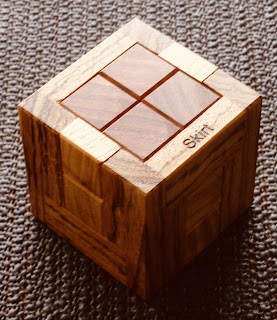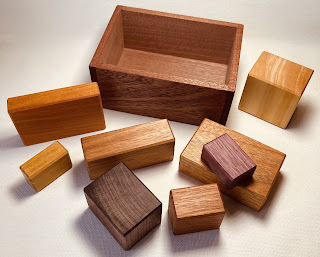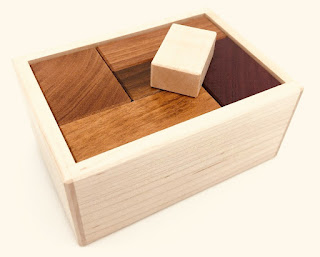I originally blogged about this puzzle in 2017 and recently received a copy by Tom so thought I should update it.
Bill Cutler kindly shared this about all of these Melting Block designs:
“The original Melting Block was designed by Tom O'Beirne in the 1970's and is based on the equations:
3x3x3 = 27 and 2x2x7 = 28. If you take 27 blocks of size 19x29x44 they will nicely fit into a rectangular box 57 x 87 x 132, but 28 of these same blocks can fit into the slightly larger rectangular solid 58 x 88 x 133.
Tom constructed 8 different rectangular solids, each one made up of 1,2,4 or 8 of the basic blocks. The solution to the 3x3x3 is trivial, and the solution to the 2x2x7 is a little challenging to find.
I believe what is known as Melting Block #2 was designed by John Rausch and uses a variation of the rectangular solids that is more difficult to solve. But it is still based on the 19x29x44 block and the 3x3x3 and 2x2x7 larger boxes.
What I call Melting Block 4 is based on the equations:
3x3x7 = 63 and 4x4x4 = 64 . The basic block size is 37 x 49 x 65, and the two box sizes resulting are 147 x 195 x 259 and 148 x 196 x 260. I called it 4 because of the use of 4 cubed.
There are a lot of different block sizes that can be made from the basic block size, and a large number of possibilities for the combinations of different pieces. The surprising thing John and I found was that there are sets of these blocks in which the solutions to the two larger boxes are both unique. In fact, we identified 76 sets of blocks that have doubly-unique solutions. In can be quite challenging to find some of these solutions by hand, but it is particularly interesting because you can make use of the basic idea behind the puzzle to help in finding the solutions.
There were a couple of choices for marketing as a puzzle:
1) Pick one of the 76 double-unique designs and use this one.
2) A "multi-puzzle" that consists of one box, a bunch of pieces labelled somehow, and a list of the 76 piece combinations.
Eric didn't want to do a multi-puzzle, so we chose one of the 76 combinations to use.”
Tom’s version of JR’s New Melting Block uses Sapele for the Box with Canarywood, Chakte Vega, Yellow Narra, Pau Amarillo, Osage Orange, Purpleheart, Walnut and Mahogany, for the Pieces.
Eric’s version of JR’s New Melting Block uses Maple/Ash for the Box, with Purpleheart, Mahogany, Zebrawood, Walnut, Maple, Morado, Granadillo, and Goncalo Alves, for the Pieces.
Here’s Eric’s original description from CubicDissection where the newest variant called ‘Melting Block 4’ designed by John Rausch and Bill Cutler is currently available for purchase:
“New Melting Block by John Rausch is an improved version of Tom Obeirne's original Melting Block puzzle. This paradoxical 3-D packing puzzle has two unique assemblies, one using seven pieces and the other using all eight. There are two possible solutions for each assembly.
The seven-piece solution seems to fill the box entirely, with little room to spare. The leftover block seems far too large to fit in the box...yet somehow, impossibly, the eighth piece does fit when the second solution is discovered.
NMB is the result of an exhaustive mathematical analysis. Of all possible piece subsets and assemblies, over 33 million solutions were reduced to two possibilities. New Melting Block is far more difficult than the original Melting Block and a wonderful addition to any collection.”




































